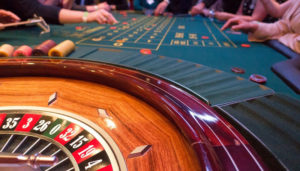Las Vegas Gambling Tips – The Mathematics Of Poker and Gambling
Las Vegas Gambling Tips: The Mathematics Of Poker and Gambling
On The Town With Vegas Vic
By: Victor H. Royer
Welcome to Las Vegas! My name is Victor H. Royer, but everyone just calls me Vegas Vic. I was named after that famous neon sign in Downtown Las Vegas, that cowboy with the hat on top of the Pioneer Club, always waving his hand and beckoning to his long love, Sassy Sally, on the other side of the street. I will be writing a few articles for AccessVegas.com, so I hope you enjoy them.
The Mathematics Of Poker and Gambling
There are quite a few people in the gaming business, particularly writers and gaming experts, who are often prone to overusing mathematical percentages, frequencies of occurrence, probabilities and so. Basically, overusing the importance of mathematics in gambling. Even I have been, on occasion, guilty of doing so. It is easy to understand why. Mathematics is such a useful tool in trying to explain certain things. It is also an undeniable fact. Without mathematics, gambling would not be possible, at least not the way we understand it now in the current world of casinos and casino games. Indeed, just about everything in gambling relies on mathematics in one way or another. For example, if we have a starting hand of two-aces and a suited 10 in seven card stud, we may know that the mathematics indicates that we will make a straight flush about 0.02% of the time, or that we will make three of a kind about 9.75% of the time, or that we will make two pair about 41% of the time. Simple math, right?
Well, not entirely. Although such a sequence of cards will, inevitable, prove to be so in the long run of infinite statistical probability (all universe being equal), it doesn’t mean that it will do so for you while you are actually playing. Further, computer programs which are written for tests such as these which produce the overall statistics for poker hands, based on the randomness of expected probability, aren’t perfect. Perfection, as a concept, is all but impractical in the real world, and not just in gambling. Your home computer isn’t perfect, and neither is mathematics as a science. In mathematics, there are no absolutes. The truisms expressed in mathematical terms are in themselves based on certain assumptions, many of which are totally unsupported by any empirically-derived circumstances. In fact truisms are largely vacuous in concept. They may have absolute inherent values within their own designated parameters, but are for all intensive purposes useless. An algebraic truism such as (a = a) may be absolute, but useless for anything but itself. And mathematical equations such as 1 + 1 = 2 may be useful in determining values, but they are based on assumptions of perceived reality of whole numbers, and what their meaning is within specified circumstances. So what does all this mean for poker players? Or gamblers in general?
It means that the expected probability of making a hand, or of a win or loss, is an assumption, one which is based in large part on a further set of assumptions which went into the creation of the mathematical profile of that hand’s statistical probability ranking and odds. In addition, such series of mathematical assumptions are further compromised, versus the real-world of in-casino play, by the fact of the testing and research which goes into the validation of such hand’s ranking and percentage of event calculations. These tests involve a whole series of probability tests, vested in the principles of probability calculus and event-actuality. Such tests are conducted under laboratory conditions, and consists of millions of simulations done with computers. These computer tests themselves run on other computer programs, and in the end provide an analysis of the relative frequencies of occurrences which are then computed to equate to the expected percentages. This then becomes the basis for the probability ranking of such hands under the designated starting and ending circumstances. What is missing in all of this is the reality of the short-term play by players in the actual casino. No poker player will play the game for the same number of consecutive events which were part of the tests for that sequence of hands. This is simply impossible by any human, and therefore machines are used to perform these tests and calculations. Consequently, what is missing in all such mathematically-derived recommendations for profitable play, whether for poker hands or any other gambling game, are the facts of the limited exposure by the player to that sequence of hands, or game.
Of course it is better to play hands whose starting percentage value is statistically higher than another. That is simple common sense. However, reliance on such numbers alone isn’t. If you continually chose to play hands simply and only based on the expected mathematical probability of event occurrences, then you will lose more often than not. Yes, the statistics indicate that if you played the hands for all their test-events, in the end you’d be that percentage favorite to win the pot (overall, based on the percentage value and raking of such hands in such events). But that isn’t what you will do as a player in the casino, playing poker for a few hours, or even several days, weeks, or even months at a time. In your actual in-casino play, you will play any given hand at far less than the overall mathematically-derived probabilities of event occurrence. This means that no matter what starting hand you select, even the better-odds higher rank hands, your individual event-occurrence expectation will not be anything close to the overall mathematics of that hand’s overall percentages. You will either win the pot at a rate far higher than the mathematical probabilities indicate, or far less. You will either win a lot more than the mathematics indicate should be your event experience, or not nearly as much. Therefore, the reality is that choosing any poker hand solely based on the averages of expected event probability of occurrence won’t do. It is for this reason that I have come to believe that over-reliance on mathematics as a guide for gambling success is inherently flawed.
Your choices of hands to play need be far more “variableâ€. And “variables†are the death-knell for mathematicians. Mathematics does not like “variablesâ€, because by their very nature they are mathematically indefinable. What this means is that anything which cannot be expressed in whole number absolutes, even allowing for fractions, is untenable. And indefinable. As a direct result, your success in gambling, and in poker, is not wholly dependant on such numerical factors alone. The “variables†in your choices of hands are factors such as:
> Play observation
> Action given to that table
> Your play time and bankroll
> Your betting strategy
> Your psychological predisposition to attractiveness of certain kinds (such as “liking†certain hands, draws, opponents, pot odds and so on)
> Your aptitude
> Your skills
> Your ability to notice and adapt
> Your resiliency
> Your dedication to abstinence from depressants such as alcohol while gambling
And dozens more reasons and situations of this kind. These are all mathematically indefinable variables, all of which contribute to your overall gambling success at that game, and in your selection of such a game and starting hands.
There have been numerous examples where gaming experts have taken far too much stock in overemphasizing mathematics as the end-all holy grail of gambling success (and I include myself in this group in some of my earlier writings). We have all done this at one time or another, and it is easy to see why. Numbers and percentages are easily seen, viewed, understood and explained. They are the ideal “tool†by which to try to impart certain aspects of knowledge to readers. But what has been by and large missing from many such writings is the fact that mathematics, and explanations vested in mathematical derivatives such as percentages and probabilities, are a tool for explanations, and not the sum-total of all successes in gambling.
This is not a problem confined to gambling. As a society, we have become increasingly reliant on the perceived “purity†of numerical information. It fits nicely in all that we consider, and perceive, to be constant. We are human creatures in a desperate search for order. And as such we expect order wherever we look, and if we don’t find it, we find way of creating it. It helps us understand. As such, a useful tool. In the reality of your life, and play, you need to make two basic decisions:
1 Are you playing for entertainment?, or,
2 Are you playing for profit?
If your answer is entertainment, then your reliance on mathematically-derived assistance is a waste of your time. You should instead rely on assistance derived from the “variablesâ€, as described above.
If your answer is profit, then you need to combine the realistic differential between cold mathematics and the real-world of your exposure to that set of circumstances, combined further with your particular selection of “variablesâ€. These then will constitute your individual success rate.
The mathematics of gambling as I have chosen to apply it and describe it here, applies equally to your choices of any gambling game. While much has been touted and written about regarding “odds†and “percentages†inherent in gambling games (and table games in particular, myself included as an author of such earlier works), the fact is that the limited exposure which any gambler will have to these games all but eliminates any odds-advantages in such mathermatiacally perfect play, versus the inherent disadvantages in the game’s rules, thus completely dissallowing and forgetting even one of the most important game factors such as the game’s volatility index. In fact, the sad reality is that some players will win even when playing extremely badly and making all the kids of decisions on which gaming purists will frown, including playing decisions which are horrendously wrong — as based on these mathematically-derived sets of rules of what to do and when. And this applies to all gambling games in general.
The point in all this is that your decisions on what to play, and how to play it, should not be solely vested in principles of mathematics. Just because a decision in poker, for example, calls for — let’s say — a re-raise, as based on the mathematically-derived sets of rules for pot-odds and expected probability of a win based on the hand value, this doesn’t mean that at that precise instant you should always do so. There may be other variables to factor in this decision. In the real world where nothing is fixed, your decision in this case, and other similar cases, may be far more profitable by ignoring the math and probabilities. Of course, you do need to know how to play the hand, but then you should also be able to make other decisions regarding your play, and not only take as your guide the math, odds and probabilities.
Over-reliance on mathematics, odds information and probability calculus, can lead one to expect events which simply will not occur for that slice of the overall reality which you will experience as a player at that game, and with those hands. Your personal adaptability to these situations is the key to continued success within the small slices of the infinite experience. Mathematics and probabilities are calculated with a mind to infinity, as a resource for estimating the likelihood of occurrences based on a defined set of parameters and expectations. All these are assumptions vested in the rules of reason and theoretical logic. None of them have any semblance of individual-event-reality as a basis. Consequently, your successes, or failures, in gambling have far more to do with your abilities to adapt to the circumstances at hand, and far less to do with what the odds are, or percentages of expected events, or overall mathematical statistics. That’s why poker players can make a living at poker, because they have learned how, and when, to disregard the mathematics. And the same applies to the few professional Blackjack players who can affect the overall outcome of their sessions, as well as to any other player who desires to either play professionally, or has at least mastered the principles of game variance.
Adapting is not as hard as it may seem. Yes, you should learn all that you can about the game, it’s odds, percentages, and overall mathematics, but then put it away in the back of your mind. Then play the games based on actual-event-experiences, and be able to modify your decisions in an instant. Take into account all the variables of the experience, and the psychological factors, including your own psyche at the moment, and adapt your decisions accordingly. And that’s how you will be able to keep yourself ahead, more than behind, in your gaming success.
Victor H. Royer, known as Vegas Vic, is the author of 42 books. Mostly known for books, articles, and columns on casino games and gambling, he is also the author of New Casino Slots, Great Gamblers: True Stories and Amazing Facts, The Great American Joke Book, as well as his works of Fiction, which include: Another Day, and the Western: Riders on the Wind. Versatile and multitalented, Royer is the creator, producer, and host of the Web-TV show Great Casino Slots, now showing at www.LasVegasLiveTV.com. He also composes music and performs under the names Glenn Diamond, Pappy Jones, Hans Dorfmann, and Miguel Armandaiz. For more information, please visit him at www.MoreCasinoDeals.com and www.GamingAuthor.com. Sign up for the Insider Advantage Newsletter at: http://www.accessvegas.com/old-access/membership
His books can be ordered through this website, by following the links provided
(c) Copyright 2016 Victor H. Royer. All rights reserved. For syndication purposes, contact GSR Holdings Inc. at: [email protected]
Return To Las Vegas Gambling Tips







